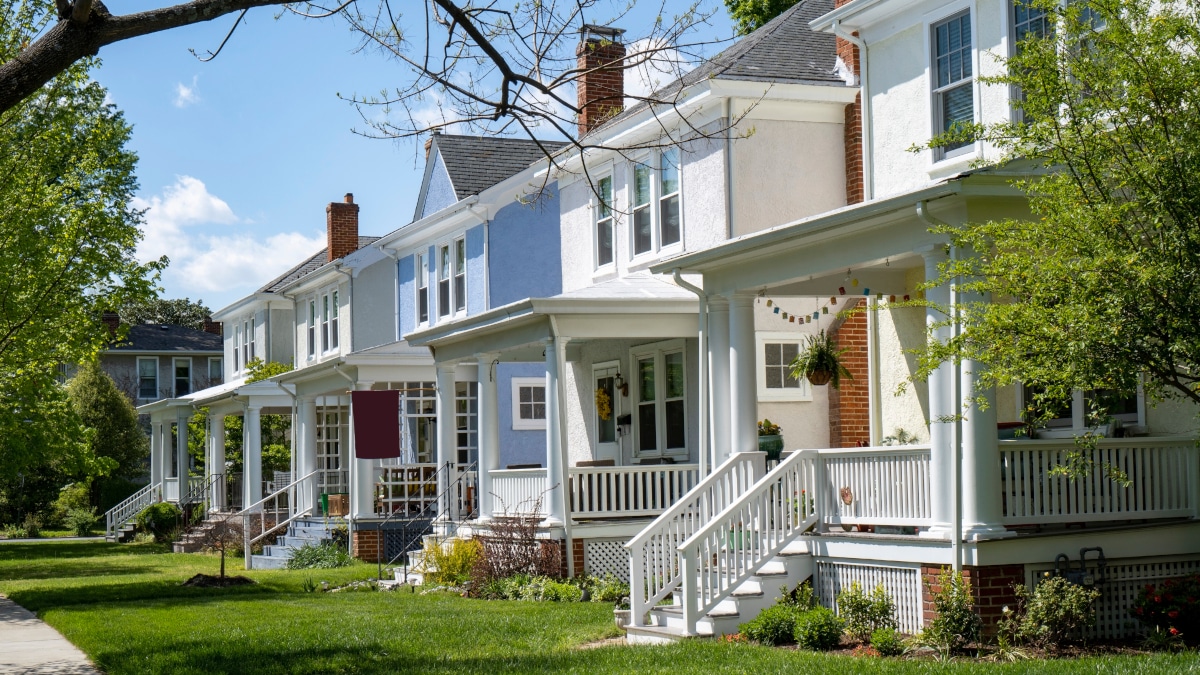
Published
Cost to sell in Virginia | Realtor commission | How to save | Closing cost calculator | FAQs
Real Estate Witch aims to demystify the real estate industry and increase transparency for consumers. We are committed to sharing unbiased content. Some of the links on our site are from our partners who compensate us. Learn more about us and our mission to simplify every step of the real estate journey.
The average cost to sell a house in Virginia is 5.87% of a home’s final sale price, which includes realtor commission (5.45% of the sale price) and seller closing costs (0.4%).
It costs home sellers in the Old Dominion state an average of $21,835 to sell a home priced at $371,302 (Virginia’s average home price).
However, Virginia realtor commission and seller closing cost figures vary widely by market.
You can also save thousands by using an agent-matching service to find a reduced listing commission far lower than the state’s average rate of 2.72%.
Here’s a complete breakdown of the average costs of selling a house in Virginia, including tips on how to save on your sale.
Cost of selling a house in Virginia
| Fee type | Average fee | Average cost |
|---|---|---|
| Realtor fees | 5.45% | $20,236 |
| Closing costs | 0.4% | $1,599 |
| Total costs | 5.87% | $21,835 |
*Costs assume a sale price of $371,302. Numbers are rounded off and may not be 100% precise.
It’s relatively cheap to sell a house in Virginia compared to other states. The table above shows that it costs 5.87% of the home’s purchase price when factoring in realtor commissions and closing costs.
That’s lower than the national average of 6.20%. Even with Virginia’s relatively higher home values, it’s cheaper to sell on a total cost basis compared to the national average.
| State | Home value | Cost to sell (percent) | Cost to sell (dollars) |
|---|---|---|---|
| Virginia | $371,302 | 5.87% | $21,835 |
| Maryland | $401,305 | 6.15% | $24,788 |
| West Virginia | $152,373 | 7.22% | $10,983 |
| Kentucky | $192,245 | 6.80% | $13,126 |
| Tennessee | $306,156 | 6.58% | $20,064 |
| North Carolina | $318,266 | 6.26% | $19,841 |
Overall home prices in Virginia are higher than in any neighboring state except Maryland.
Virginia has the lowest cost to sell as a percentage of the home price in the region, but the state’s high home prices mean that only Maryland has a higher average cost to sell in dollars. It costs an average of $21,835 to sell a home in Virginia.
Home values vary quite a bit across Virginia, so your total home sale costs will also vary. For example, the median home price in July was $340,500 in Virginia Beach but $675,000 in Loudoun County, according to Redfin data.
To determine the current market value of a your home, you can ask a real estate agent for a free comparative market analysis (CMA). Most real estate agents consider it a part of their job to provide a CMA report when you ask about listing your home. (It’s a way for them to show you that they’re knowledgeable about the local market and hopefully earn your future business.)
Here’s an example of your potential costs at various price points, including realtor fees and seller closing costs.
| Sale price | Realtor fees (5.45%) | Closing costs (0.4%) | Total cost |
|---|---|---|---|
| $300,000 | $15,690 | $900 | $16,590 |
| $400,000 | $20,920 | $1,200 | $22,120 |
| $500,000 | $26,150 | $1,500 | $27,650 |
| $750,000 | $39,225 | $2,250 | $41,475 |
| $1 million | $52,300 | $3,000 | $55,300 |
The main factors impacting your Virginia home sale costs include:
Typical real estate agent commission in your area
While the state-wide average rate is 5.45%, rates may be higher or lower depending on what’s normal in your area.
Your success (or failure) in negotiating rates
Realtor fees aren’t fixed — they are completely negotiable. You may be able to negotiate a rate lower than what’s typical in your area.
How you find a realtor
You can potentially save thousands in realtor fees by using an agent-matching service to find a realtor that has pre-negotiated a listing agent fee that’s much lower than the typical listing agent commission rate of 2.72%.
Optional costs
The estimated total cost to sell of 5.87% in Virginia does not include other potential costs like home staging, deep cleaning, and pre-listing repairs, which could add thousands more to your home sale costs.
Your negotiated contract
Seller closing costs are unusually low in Virginia since buyers are expected to cover most of the expenses in a typical home sale.
Home sellers are normally responsible for all commissions, some title company fees, the grantor tax, and prorated property taxes. Sellers may also be on the hook for attorney fees, home preparation costs, homeowners association (HOA) fees, and a mortgage payoff.
In theory, sellers may also offer to cover certain buyer closing costs to sweeten the deal, although this is less likely to happen if your housing market currently favors sellers over buyers.
Buyers take on most of the other expenses including appraisal and inspection costs, title search fees, title insurance, their own attorney fees, and buyer closing costs for the mortgage such as an origination fee.
Here’s a deeper look at your expected home sale costs.
1. Virginia realtor commission (5.45%)

Virginia home sellers pay an average of 5.45% of the home’s sale price on realtor commissions, which is deducted from the seller’s net proceeds at closing. The 5.45% fee covers both the listing agent and the buyer’s agent commission.
Your actual commission cost depends on your home’s final sale price. Here’s what you might expect to pay in realtor fees at various price points.
| County | Median sale price | Commission cost |
|---|---|---|
| Fairfax | $643,750 | $33,668 |
| Prince William | $521,590 | $27,279 |
| Virginia Beach | $340,500 | $17,808 |
| Loudoun | $675,000 | $35,303 |
| Chesterfield | $375,000 | $19,613 |
*Median sale prices as of July 2022 according to Redfin. Commission costs assume an average realtor commission of 5.45%.
How to save on Virginia realtor fees
Here are some tips on how to save money on your home sale.
Use a discount broker
A discount real estate broker offers sellers a reduced commission fee with no strings attached. The broker’s listing agents charge less than the average rate, such as a 1–2% listing fee vs. the typical 2.5%–3% rate.
Selling at a higher price point leads to even bigger commission savings using a discount broker vs. finding a realtor through traditional sources, like through a family member or friend.
Agents that partner with these firms also provide all of the services you’d expect to receive from a traditional realtor. Our agent-matching service is free to try with no obligation, so it’s worth starting out here.
» MORE: The Best Discount Brokers for Every Budget
List your home without a realtor
You can avoid paying Virginia listing commission entirely by selling without a realtor. Expect to save 2.72% off of your home sale, since you avoid paying listing agent commission.
However, the typical FSBO home sells for close to $60,000 less than agent-listed homes, according to the National Association of Realtors, so you might lose money on the sale. You’ll also be on the hook for all of the tasks normally handled by a listing agent.
Negotiate a lower rate
Agent commissions aren’t set in stone. There’s no law setting a fixed realtor fee in any part of the country, including Virginia, so you can try to negotiate a lower commission rate with your realtor.
You may have more luck reducing the commission rate if you plan to buy a new home with the same agent that’s helping you sell since the agent will earn a commission on both transactions.
Negotiating commission may also work on a high-value property, since the agent will still earn a substantial commission on the home sale, despite the lower rate.
2. Closing costs for sellers in Virginia (0.4%)
Seller closing costs typically add another cost of 0.4% or more to the home’s final sale price, according to our data. (Closing costs do not include realtor commission.)
Based on the average Virginia home value of $371,302, the typical home seller pays $1,599 in closing costs.
Virginia seller closing costs typically include title company fees, grantor taxes, and prorated property taxes.
The seller might also be responsible for Homeowners Association (HOA) fees, mortgage payoff, and/or prepayment penalties. In some cases, the seller may also cover the buyer’s closing costs by offering what is called a “seller subsidy” on the sales contract.
Buyers are generally on the hook for everything else, including appraisal and inspection costs, title search fees, title insurance, and loan origination fees.
Title company fees
In Virginia home sales, a title company or attorney handles the legal details of the closing, including bringing the required documentation, recording the transaction, and disbursing the funds.
The buyer customarily chooses which title company to use in Virginia, but in some cases, the seller may select the company to handle their portion of the settlement with the buyer’s agreement.
The seller’s portion of the title fees includes legal review and preparation of the sale documents. Title fees for sellers average about $700–1,100 in Virginia, according to the website of MacLean-based realtor Will Rodgers.
Grantor tax
Virginia home sellers must pay a real estate transfer tax called a “grantor” tax. The rate for the grantor tax is $0.50 for every $500 of the sale price (rounded to the next $500), or roughly 0.1%. The grantor tax amount is divided equally between the state and the locality.
Home sales also incur state and local “grantee” taxes, paid by the buyer. All told, Virginia transfer taxes equal $3.50 per $1,000 of the home’s sale price, usually split as $1 per $1,000 for the seller and $2.50 per $1,000 for the buyer.
For example, in a $400,000 home sale, the seller would owe $400 in transfer taxes, while the buyer would owe $1,000.
Prorated property taxes
Virginia home sellers must pay property taxes on the days they’ve owned their home in the calendar year. Taxes are prorated and split between the seller and buyer.
The tax is due at closing. Actual costs depend on your annual taxes, and how many days you live in your home up until the closing date.
Speak with your realtor or attorney for more details on what you might owe in prorated taxes.
3. Other potential costs
Attorney fees
Virginia law does not require home sellers to hire an attorney to handle the closing, but it’s usually a good idea to have a lawyer on your side if you have any questions about the transaction or your responsibilities as a seller.
Fees vary depending on the law firm. For example, Richmond-based LingleLaw charges $350 for contract preparation, $425 for seller representation, and $250 for deed preparation only. Real estate attorneys charge an average of $336 per hour in Virginia, according to legal technology firm Clio.
Attorney or title company fees total around $800, according to the website of Arlington-based realtor Renata Briggman.
Save on legal fees!
JustAnswer connects you with an experienced real estate lawyer for only $60 a month. Get personalized legal advice in minutes, any day of the week. You can save an average of $290 every time you get a lawyer’s answer on JustAnswer. Start chatting now!
» LEARN: Do I Need a Lawyer to Sell My House?
Home preparation costs

Preparing your home for sale could add thousands more to your upfront costs.
Home staging can cost anywhere from $2,000–10,000 upfront, depending on the size of the house and the number of pieces of furniture, according to Michael Kelczewski, a realtor with TTR Sotheby’s International Realty in Virginia.
In addition, there is generally a monthly fee to rent the furniture ranging from $300–1,000. A far cheaper option is virtual staging, which costs around $20 per photo and achieves similar results.
Regardless of your choice, you need high-quality photos of your house to display online. Professional photos can cost $100–300, but your real estate agent will likely arrange and pay for this.
Expect to spend at least $300 for deep cleaning, if required. Finally, pre-listing home repairs and improvements could add hundreds, if not thousands more to your budget, depending on your home’s condition.
Pre-listing appraisal and inspection
An appraisal is a professional estimation of a home’s value. Buyers usually pay for appraisals in Virginia, but obtaining a pre-sale appraisal can give you a more accurate starting point for pricing your home. Appraisals in Virginia cost an average of $300–600.
You may also want to consider ordering a pre-listing inspection to identify any problems with the house before the buyer can discover them, so there are fewer surprises during negotiations.
The cost of a typical home inspection in Northern Virginia ranges from $200–520, depending on the size of the home, and includes a basic check of all the major systems, according to Lambert Home Inspections. Companies charge extra for mold, radon, water, and indoor air quality testing.
Homeowners association dues
You may owe homeowners association (HOA) dues if your home is located in an HOA community. Sellers are typically responsible for covering a prorated amount of their annual membership dues at closing.
If the HOA charges fees to transfer homeownership records to the buyer at closing, the seller usually pays them. Costs vary between communities, but they commonly range from $150 to $500. Check with your agent, attorney, or HOA board for more information on what you might owe.
Buyer’s closing costs
In addition to the costs outlined above, buyers may request that sellers cover some of their closing costs. Seller concessions, described as a “seller subsidy” on the sales contract, include anything that the seller gives the buyer to close the deal.
Seller concessions often come in the form of seller credits towards the buyer’s closing costs — 2–3% of the home’s sale price is common — or home warranty policies. However, they can also include compromises that don’t hold monetary value, such as an agreement to close on a date that’s preferable to the buyer.
While every transaction is different, the housing market in Northern Virginia remains very active, so it’s rare for sellers to provide many concessions in 2022. “Houses are selling immediately, off-market, way over asking,” notes Kelczewski.
The Washington D.C. metro area, including Northern Virginia, “is not anywhere near a buyer’s market and I don’t think it will be anytime soon,” he adds. The market is so competitive that buyers sometimes offer to pick up sellers’ closing costs.
Here are some common buyer closing costs you might be asked to cover:
Capital gains tax
The IRS offers a tax break on capital gains from the sale of your primary residence, as long as you meet certain requirements:
- Single homeowners can deduct up to $250,000 of gains from the sale of their property.
- Married couples can deduct up to $500,000 of gains.
- You must have occupied the property for at least two of the past five years.
- You can also deduct certain repairs and improvements from your home’s cost basis.
» LEARN: How to avoid capital gains on a home sale
Cost of selling a house in Virginia calculator
Use our calculator to get a rough estimate of what you might walk away with in your home sale. Change the home sale price and closing costs to fit your particular situation.
For more accurate numbers, we recommend finding a local realtor to provide you with a free seller’s net sheet: a personalized document that estimates how much you may earn in your home sale.
Virginia seller closing costs: FAQs
How much are closing costs for sellers in Virginia?
Virginia closing costs average around 5–6% of a home's final sale price. That figure includes common seller closing costs — such as title company fees, the grantor tax, and prorated property taxes — as well as realtor commission fees, which often cost sellers at least 5%.
We break down the best ways to save on Virginia realtor fees.
Who pays closing costs in Virginia?
Buyers and sellers have separate closing costs in Virginia. Prorated property taxes are split between both parties. Sellers are usually responsible for paying all commissions, some title company fees, and the grantor tax, while the buyer covers most other closing costs.
However, actual costs depend on your location. We recommend you find a realtor to get a seller's net sheet, which breaks down all of your potential home sale costs. Our agent-matching service can match you up with top local agents for a free seller's net sheet.
Do buyers or sellers pay realtor fees in Virginia?
Sellers usually cover both the buyer's agent and seller's agent commission in Virginia, which amounts to over 5% of the home's final sale price. Real estate commission will likely be your single largest home-selling cost. Fortunately, it's negotiable.
What is the cheapest way to sell a house in Virginia?
The cheapest way to sell a house is to use an agent-matching service that has pre-negotiated a low listing agent fee with its agents. That could save Virginia home sellers thousands in realtor fees.
Recommended reading
The True Costs of Selling a Home Revealed: What does it really cost to sell a house in the U.S.? We explore all of the common expenses in a home sale, and how you can save thousands.
How to Sell a House Without a Realtor in Virginia: Selling a home For Sale by Owner (FSBO) in Virginia means you won’t have to pay a listing commission, but there are major challenges you should learn about first.
How to Find a Realtor: Find out how you can connect with a great real estate agent. We help you zero in on the best approach, whether you’re selling or buying.
Seller Net Sheet Guide: Learn how a net sheet can help you estimate your potential home sale proceeds, and how to get one for free.
Negotiating Realtor Commission: Knocking your real estate commission down just one percentage point could save you a ton of money on your home sale.


Leave a Reply